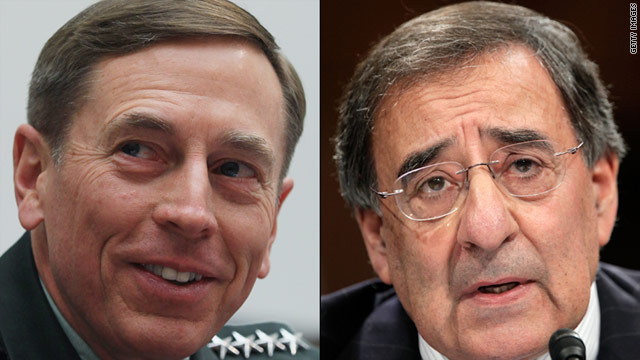New men, new missions at Pentagon and CIA

- Gen. David Petraeus has been tapped to head the CIA
- CIA Director Leon Panetta has been nominated to lead the Defense Department
- Petraeus will provide much-needed leadership for an agency more heavily involved in military missions
- Panetta will likely help oversee an era of declining Pentagon budgets and fewer large-scale conflicts
Washington (CNN) -- It's Washington's version of the reality television show "Wife Swap."
President Barack Obama has tapped one of the country's top military men to head the Central Intelligence Agency, while the current CIA chief is being nominated to take charge of the military.
The decision to send Gen. David Petraeus to the CIA and shift CIA Director Leon Panetta to the Pentagon is as much a reflection of the political skills of two talented bureaucratic infighters as it is a sign of the administration's shifting agenda in a variety of hot spots around the world.
Faced with a looming reelection campaign and tighter budget constraints, Obama wants to move ahead with plans to complete the U.S. withdrawal from Iraq and begin the process of winding down the unpopular war in Afghanistan, according to numerous analysts. New fiscal and political realities are contributing to a growing emphasis on smaller, more flexible, less costly, and potentially more dangerous military and paramilitary engagements in the years ahead.
Translation? A smaller Defense Department that is more reliant on solid intelligence gathering, and an increasingly militarized CIA more heavily involved in armed conflicts. Panetta and Petraeus are, by all accounts, uniquely qualified to manage the change.
Obama shuffles familiar faces in key security roles
"This team will provide the leadership to help make our nation safer," said South Carolina GOP Sen. Lindsey Graham, a key congressional voice on security matters. "I could not be more pleased with these selections."
The post-9/11 wars have made Pentagon and CIA coordination "essential," former CIA Director John McLaughlin told CNN. "It hasn't always been that smooth, but over time we've learned from experience."
 Obama shuffles national security staff
Obama shuffles national security staff
 Panetta tapped for defense secretary
Panetta tapped for defense secretary
Panetta, 72, has been described as the consummate Washington insider. He took over at the CIA in February 2009, and previously served as chief of staff to President Bill Clinton between 1994 and 1997. Prior to that, the California Democrat served as director of Clinton's Office of Management and Budget (OMB) -- a position that, by definition, requires mastery of tricky fiscal situations and an understanding of the federal government's sprawling bureaucracies.
As of February, more than 1.4 million people were serving in the U.S. armed forces.
Panetta also served in the House of Representatives from 1977 to 1993, a period in which he established deep congressional ties. His friendships and institutional knowledge of Capitol Hill will be critical in terms of helping to mold congressional opinion and balance Pentagon priorities against growing deficit fears.
In taking charge of the Defense Department's changing missions, Panetta will "deal with it the way he dealt with issues at the CIA," McLaughlin said. "He'll seek the facts."
Over the last couple of years, Panetta has "had to make difficult decisions on which there were no easy answers," McLaughlin added. "That's pretty good schooling for the kinds of decisions he is going to have to make at the Pentagon, where ... difficult choices are going to be necessary."
For his part, Petraeus already has an "intimacy with the (CIA's) capability," McLaughlin said. "He knows its strengths. He knows whatever shortcomings it may have. He knows the people very well. He knows what buttons to push."
Petraeus, 58, assumed command of the NATO International Security Assistance Force (ISAF) and U.S. Forces Afghanistan in July 2010, after serving for more than 20 months as commander of the U.S. Central Command. He has worked with the CIA in helping to oversee the military's predator drone strikes against extremists in both Afghanistan and Pakistan.
Bennett: Why Panetta, Petraeus are smart choices
Petraeus also previously commanded multi-national forces in Iraq, leading the so-called "surge" -- the deployment of more U.S. troops and the implementation of new strategies to reverse setbacks and make strides to defeat the insurgency and end the war. Over the years, he has retained enormous popularity and respect in the halls of Congress.
During his time commanding the U.S. Army Combined Arms Center and Fort Leavenworth, he oversaw the development of the Army/Marine Corps Counterinsurgency Manual.
Petraeus, analysts note, already has a close relationship with intelligence sources around the broader Middle East, including Libya, Egypt, Yemen, and a host of other pivotal countries. In that respect, he will have little trouble transitioning to the CIA's traditional role of intelligence gathering.
One major change for the general, McLaughlin notes, is that the CIA director typically does not make policy.
The head of the CIA "basically defines the situation as it exists on the ground (and) informs policy, but stops short of actually recommending policy," he said. "Gen. Petraeus will be moving into a job that has a somewhat less prominent policy role than the jobs he has had in the past."
Former CIA Director Michael Hayden said a key cultural difference waiting for Petraeus is that, unlike the military, "folks at the CIA don't get the hierarchy thing real well. He will be faced with a degree of informality with which he is unaccustomed."
Hayden, however, didn't see that aspect of the transition as a particularly large hurdle.
At the CIA, Petraeus will find a culture of "patriotism, service, sacrifice, (and) value of group before self," he said. It is "a culture with which he will have great comfort."
CNN's Pam Benson, Tom Cohen, and Barbara Starr contributed to this report




